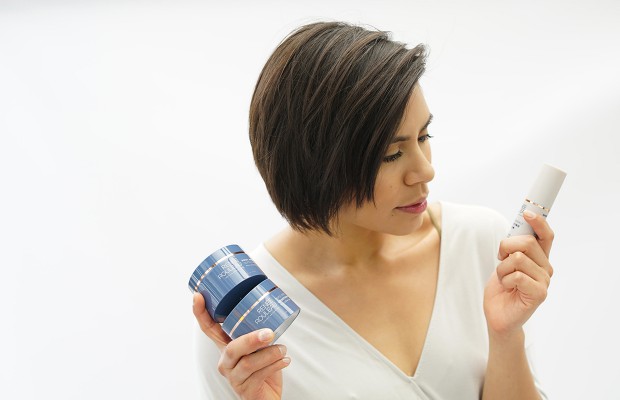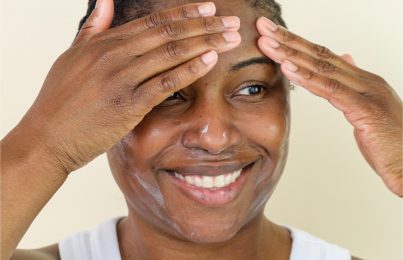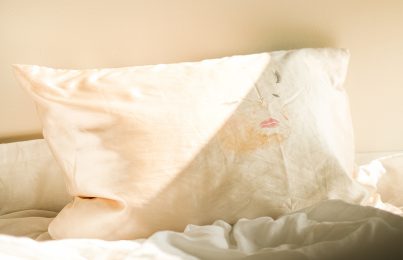Updated 12/1/17. I often hear people describing their skin as “dry on top but oily underneath.” Well, I’m here to set the record straight—you can’t have both dry and oily skin. If your skin is producing oil but still feels “dry,” what you’re actually experiencing is dehydration. Keep reading to learn how to fix this problem and how to differentiate between dry and dehydrated skin.
What is Dry Skin?
Dry skin is classified as skin that produces little to no oil and has small pores. This lack of oil causes dryness and flakiness, especially with age. Dry skin is a genetic condition. Some people are just born with fewer oil glands than others.
What is Oily Skin?
Oily skin is classified as skin that produces oil and has visibly larger pores. This causes the skin to get greasy and have a shine. Oily skin is a genetic condition characterized by active oil glands. Oily skin types are prone to clogged pores and breakouts.
What is Dehydrated Skin?
Dehydration is a temporary skin condition, not a genetic skin type. It is often found in oily, combination or normal skin that is lacking water (not oil), which causes the skin to feel tight. (Watch this quick video to see what dehydrated skin looks like.)
I often hear people with oily skin types saying their skin is feeling dry, but they’re still getting breakouts and aren’t sure how to treat this combo. This is a telltale sign that someone is dehydrated. If you’re getting breakouts or clogged pores, your skin is producing oil. If your skin is producing oil, you can’t be a true dry skin type. It’s that simple!
To remedy what feels like both dry and oily skin, these people might start using a heavy moisturizer formulated for dry skin, but this can cause more clogged pores, bumps, and breakouts. Sound familiar? Sometimes they think it’s because they don’t drink enough water, but hydration levels in the skin have very little to do with drinking water, despite what you’ve always been told.
The truth is that if your skin is naturally oily but acting “dry,” the underlying issue is probably something to do with your skincare routine. You may be using something too harsh.
Learn more about the differences between dry and dehydrated skin, as well as how to best care for it.
How to Treat “Dry and Oily” (A.k.a Dehydrated) Skin
In my thirty years as an esthetician, I’ve observed that the underlying cause of dehydration is usually harsh or drying skincare products. Here are some of my expert tips to get your skin healthy and balanced and alleviate the tight feeling caused by skin dehydration.
Choose Your Cleanser Carefully
Many foaming or gel cleansers are still formulated with ingredients called Sodium Lauryl Sulfate, Sodium Laureth Sulfate or Ammonium Laureth Sulfate. These are known as surfactants, which are cleansing agents that cut oil from the skin. While oily skin types do need the oil and shine to be broken down and removed by a cleanser, these ingredients are not in alignment with your skin’s natural pH and will strip too much water out of the skin after every washing. This is what leads to dehydration.
It’s important to know that what you cleanse with is the MOST important part of your skincare routine. Why? Because if you wash with a cleanser or soap that is too strong and drying, it pulls all the water out of the skin and creates a buildup of dead skin cells. The rest of your routine is then dedicated to trying to make up for this dehydration. When buying a cleanser, look for the words ‘sulfate-free’ on the bottle as this will imply that it’s a safe formula. You can get your skin properly cleaned while keeping the water in your skin where it belongs. Every good skincare routine should begin with a gentle cleanser.
Never Leave Your Skin Bare After Washing
After cleansing, you should quickly layer on an alcohol-free toner, serum (optional), and moisturizer. If you leave your skin bare for more than sixty seconds, it will start to dehydrate. After cleansing, it’s best to immediately apply an alcohol-free toner and then leave it damp on the skin when applying your next product. This way, your serum or moisturizer will lock in the hydrating benefits found in a toner.
Never Skip Moisturizer at Night so Your Skin Can “Breathe”
People with acne-prone skin are often worried about using moisturizer. They believe that it will clog their pores and not let the skin “breathe.” There are a few problems with this type of thinking. First, wearing moisturizer does not directly cause breakouts. Acne occurs when the cells that line the inner pores fail to fall off properly and the pore becomes clogged. This process happens whether you moisturize or not.
Second, respiration doesn’t happen in the skin. The concept of your skin breathing is false.
Those with oily, blemish-prone skin must use moisturizer no matter what. Your skin needs sufficient water to keep it healthy and balanced. The more balanced the hydration levels in your skin, the less likely it is to break out. Skipping moisturizer disrupts the skin’s water levels causing that “oily and dry” feeling we are talking about. This dehydration process actually stimulates more oil production, which potentially causes more breakouts.
The key here is to choose a moisturizer that is suitable for your skin type. Dry skin types need moisturizers that deliver oil into the skin while oily skin types require a moisturizer that gives water.
Use a Humidifier During the Winter Months.
If the air is moist, then the moisture in your skin will likely stay put rather than evaporating into the dry winter air. Learn more about how a humidifier can benefit your skin (and health!).
Use a Serum Underneath Your Moisturizer.
By applying a few drops of a lightweight, water-based skin serum underneath a moisturizer, you’ll get much-needed hydration to alleviate that tight feeling. I usually suggest that my clients with oily skin use Skin Drink Concentrate.
In summary, if you feel like you have dry, oily skin and your skin is feeling tight, you simply need to use a skincare routine that does a better job at balancing the water levels in your skin. It’s an easy fix!
Celebrity Esthetician & Skincare Expert
As an esthetician trained in cosmetic chemistry, Renée Rouleau has spent 30 years researching skin, educating her audience, and building an award-winning line of products. Her hands-on experience as an esthetician and trusted skin care expert has created a real-world solution — products that are formulated for nine different types of skin so your face will get exactly what it needs to look and feel its best. Trusted by celebrities, editors, bloggers, and skincare obsessives around the globe, her vast real-world knowledge and constant research are why Marie Claire calls her “the most passionate skin practitioner we know.”




Comments:
hello dr. I used to do spectra laser to bleach the sheer hair in my face and to tighten the pore as well, but I heard that over the time this kind of laser will cause wrinkels. please advise
Posted By: sara |
You’ll have to discuss this with your doctor who is performing it as I don’t do this type of procedure.
Posted By: Renée Rouleau |
Hi, my skin is oily, sensitive (always red), large pores, clogged pores, and prone to hormonal acne mostly around my chin. Everything I use makes my skin feel dry and tight and creates flakes! As you mentioned I have tried heavier creams which just makes me more oily. I learned to stay away from topical acne medication and sulfates and I’ve tried exfoliating with the Clarisonic and AHAs and BHAs. I’ve started avoiding AHAs and BHAs too – especially salicylic acid. Could I be doing too much or not enough? I’d like to try some of your products but I’m scared it won’t help. What can you recommend for me that may not be obvious to me looking at products for my skin type 3?
Posted By: Madeline Gilchrist |
Hello Madeline, Welcome to Renee Rouleau! If you mostly getting breakouts around your chin area then you really don’t want to be treating your entire face for breakouts that are not present. For chin breakouts, read this post. Based on what you have said about your skin, sounds like you are a skin type #4, not a #3 and it sounds like your moisture barrier needs to be repaired. I suggest the products for skin type #4 however, instead of the Skin Recovery Lotion at night, I recommend the Hawaiian Nourishing Cream. It’s still great for breakouts and healing the skin yet won’t be greasy. Email customer service if you need more assistance. You’ll love our line and it will really bring the balance that your skin so desperately needs.
Posted By: Renée Rouleau |
Hi I am interested in trying your products for combination skin ( oily/dry) I was wondering if you had samples I could try before I buy the line.
Thanks, Katie Hughes
Posted By: Katie Hughes |
Hi Katie, We don’t offer any samples to purchase, sorry!
Posted By: Renée Rouleau |
You can have oily and dry skin at the same time, because I do. My t-zone has always been oily and dry no matter what I do (worse after applying make-up)
Posted By: Jess |
Dry skin is a result of a damaged moisture barrier (invisible cracks in the skin that cause moisture to escape and create dryness and flakiness) which means the products that you’re using on the dry areas aren’t repairing the barrier the way your skin needs it to.
Posted By: Renée Rouleau |
Hi, my skin is really oily by my t zone, Mainly by my nose and a little dry. What moisturizer should I use?
Posted By: Mercedes Ramirez |
You can see our nine skin types and even take a skin type quiz to get a moisturizer recommended. See here https://www.reneerouleau.com/skin-types But more than likely the Sheer Moisture would be a good fit. See it here https://www.reneerouleau.com/products/sheer-moisture
Posted By: Renée Rouleau |
Hi,
I went though the skin type quiz twice and it came out as 2 and 5. Not sure which one is my skin type actually.
I don’t feel my skin too dry or too oily. In morning, just after my sleep, its oily on my nose. But after face cleanup it gets almost fine. Only nose is a bit oily sometimes and laugh lines are there. But whenever I apply moisturizer, cheeks looks oily and shiny. Which type of cleanser and moisturizer I should use?
Posted By: Arpita |
Hi Arpita, As you know, when you take the skin type it will suggest which moisturizer and cleanser to use. The main difference between 2 and 5 is that skin type 2 still gets breakouts, but only occasionally. Skin type #5 has very few breakouts if any, and is for calming red, sensitive skin. If you’re not sure, feel free to email customer service and give them more details about your skin. Or just look at the descriptions of the skin types and see which one most sounds like you. https://www.reneerouleau.com/skin-types If you apply moisturizer and your cheeks look oily and shiny, maybe it’s because the moisturizer you are using is too heavy and it’s causing that to happen.
Posted By: Renée Rouleau |
Hello.
I have combination skin, and my T zone is started to peel like crazy and it turns red somehow, especially after I wake up. By the way, my T zone has a lot of blackheads. I put a lot of moisturizer (I was using Aloe Vera gel) on my T zone but it turns out more worst. I don’t know if is my T zone lack of moisture or not. And can I still apply BB cream? Because the reddish and peeling on my face is kind of embarrassed.
Posted By: Eeleng |
It sounds like you’re not using the right combination of products to keep your skin balanced. Take our skin type test to get products recommended. https://www.reneerouleau.com/skin-types
Posted By: Renée Rouleau |
This add is trying to express that if your have oily and dry skin its the product your using not your skin. i dont use any produce besides water and my skin is oily and dry. False and misleading information.
Posted By: Ade |
This blog post was written to give tips on how to manage both dryness and oiliness. If you just wash with water and use no products at all, through a process called osmosis, when water touches your skin and is not sealed in with any moisturizer or protectant afterwards, the water within your skin will be attracted out and cause dehydration. Dehydration will cause the skin to feel tight and dry and then as a repair response to keep your skin hydrated, it will start to produce more oil to compensate for the water loss, leaving your skin oily and dry.
Posted By: Renée Rouleau |
I have a very dry skin, but when ever I try to nourish it, I start getting pimples. And when I leave the care routine, pimples just gone and my skin clear but VERY DRY .. What should I do !!
Posted By: Remii |
You should be focusing on exfoliation instead of over-moisturizing. Exfoliation will dissolve off the dryness that you’re experiencing. Our AHA Smoothing Serum 10% would be amazing for you. https://www.reneerouleau.com/t/categories/exfoliants
Posted By: Renée Rouleau |
Hi Renee,
I’m a 18 year old young adult, I know is writes for me as a man to ask you about my skin, but it’s really irritating for me in this current condition of my face’s skin. I previously used skin products but I stopped since there’s no improvement over my skin, afterwards I use water to wash my face. My current skin condition is really bizarre, once I wash my skin, it becomes dry and a couple of hour after it becomes oily, like really oily and I totally dislike it.
That’s why I’m asking a professional about this and see if I would resume using skin products that a professional might offer for me. Please reply ASAP 🙂
Posted By: Manny |
Hello Manny, It is my belief that skin is more than just dry, normal and oily. I suggest you look at my skin types and take our quiz to find out which products from my line are best for the unique needs of your skin. Your skin is definitely in need of balance with good, high quality skin care products. Click here https://www.reneerouleau.com/skin-types
Posted By: Renée Rouleau |